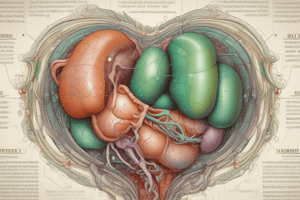Podcast
Questions and Answers
What is the most common cause of obstructed bile flow?
What is the most common cause of obstructed bile flow?
- Gallstones (correct)
- Tumors
- Abscesses
- Inflammation
Cholelithiasis affects approximately 15% of the population in the United States.
Cholelithiasis affects approximately 15% of the population in the United States.
True (A)
What may happen if the common bile duct is obstructed?
What may happen if the common bile duct is obstructed?
Bile reflux into the liver, leading to jaundice and possible liver damage.
Cholecystitis is the inflammation of the __________.
Cholecystitis is the inflammation of the __________.
Match the following terms to their descriptions:
Match the following terms to their descriptions:
What are the symptoms accompanying biliary colic?
What are the symptoms accompanying biliary colic?
Acute cholecystitis always starts with severe pain that spreads throughout the entire abdomen.
Acute cholecystitis always starts with severe pain that spreads throughout the entire abdomen.
What is the potential complication if pancreatic enzymes cannot enter the small intestine?
What is the potential complication if pancreatic enzymes cannot enter the small intestine?
What is a common complication of cholecystitis?
What is a common complication of cholecystitis?
Most gallstones are primarily composed of cholesterol.
Most gallstones are primarily composed of cholesterol.
What factors contribute to the formation of gallstones?
What factors contribute to the formation of gallstones?
Cholecystitis may result from repeated bouts of __________ cholecystitis.
Cholecystitis may result from repeated bouts of __________ cholecystitis.
Match the following risk factors with their descriptions:
Match the following risk factors with their descriptions:
Which of the following is NOT a risk factor for gallbladder disease?
Which of the following is NOT a risk factor for gallbladder disease?
Having a first pregnancy before the age of 20 increases the risk of gallbladder disease for all races and ethnicities.
Having a first pregnancy before the age of 20 increases the risk of gallbladder disease for all races and ethnicities.
What lifestyle changes can help reduce the risk of gallbladder disease?
What lifestyle changes can help reduce the risk of gallbladder disease?
Chronic cholecystitis often is __________.
Chronic cholecystitis often is __________.
Cholesterol concentration increases the risk of stone formation due to which of the following?
Cholesterol concentration increases the risk of stone formation due to which of the following?
Which of the following modifies the risk of gallbladder disease by increasing bile salt reabsorption?
Which of the following modifies the risk of gallbladder disease by increasing bile salt reabsorption?
What factor specifically increases the risk of gallbladder disease in white women?
What factor specifically increases the risk of gallbladder disease in white women?
Which of the following is NOT a modifiable risk factor for gallbladder disease?
Which of the following is NOT a modifiable risk factor for gallbladder disease?
What dietary changes can help reduce the risk of gallbladder disease?
What dietary changes can help reduce the risk of gallbladder disease?
Which group is identified as having an increased risk for gallbladder disease due to the number of children borne?
Which group is identified as having an increased risk for gallbladder disease due to the number of children borne?
Flashcards are hidden until you start studying
Study Notes
Gallbladder Inflammation
- Inflammation of the gallbladder leads to the reabsorption of excess water and bile salts.
- This increases the chances of gallstone formation (lithiasis).
Risk Factors
- Obesity: A body mass index (BMI) greater than 25 is linked to an increased risk of gallbladder disease.
- Diabetes: Individuals with diabetes are at a higher risk of developing gallbladder disease.
- Smoking: Both past and current smokers have a higher risk of gallbladder disease.
- Diet: Consuming red meat, saturated fat, and high cholesterol levels increases the risk, independent of race or ethnicity.
- Gender: For women, having more than four children or a first pregnancy before the age of 20 increases the risk of gallbladder disease.
- Hormonal therapy: Estrogen-only medications used during menopause increase the risk of gallbladder disease, particularly for white women.
- Family history: A family history of gallstones increases the risk.
- Other conditions: Rapid weight loss, biliary stasis (due to pregnancy, fasting, or prolonged total parenteral nutrition), cirrhosis, sickle cell disease, leukemia, hyperlipidemia, ileal disease or resection, and glucose intolerance increase the risk.
- Genetics: Variants of hepatic and intestinal cholesterol transporter ABCG5/G8 are associated with an increased risk of gallbladder disease.
Prevention
- Modifiable risk factors: Controllable risk factors include obesity, medications (estrogen), high-fat diets, rapid weight loss, and dyslipidemia.
- Dyslipidemia: It is identified by elevated total cholesterol, low-density lipids, triglycerides, and decreased high-density lipids in blood tests.
- Lifestyle modifications: Physical activity, increased fruit, vegetable, and fiber intake, and reduced refined carbohydrate consumption can reduce the risk of gallbladder disease.
Studying That Suits You
Use AI to generate personalized quizzes and flashcards to suit your learning preferences.




